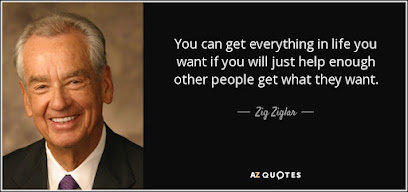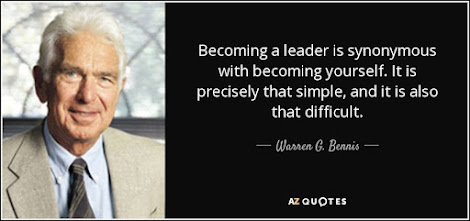The more I read and analyze this statement, the more the deeper meaning starts to reveal itself to me. I can't tell you how many times I have advised people over the years who have asked what they should do going into an interview for a leadership position or have just landed their first leadership position. "Just be yourself." At the time that seemed to be sound advice. My rationale was that they did not want to present themselves to be someone whom they were not, nor put on a phony display. They wanted to find an environment that would be healthy and one where they could develop, be productive, and be happy and satisfied. They needed to find a good match. This is critical!
I still think this is sound advise, but I am beginning to believe that I gave the wrong advice for the right reasons.
Read this quote again.
Now read it again.
It does NOT say "Becoming a leader is synonymous with being yourself." It says "Becoming a leader is synonymous with becoming yourself." Hmmm... big difference in meaning there! Being is present tense; Becoming is future tense. Being yourself equals 'this is who I am'; whereas, Becoming yourself equals "this is who I will become'. If you unpack this quote and dissect it, you begin to see the deeper meaning. At least I did!
Both becoming a leader and becoming your self is a process. The simple part is that leadership development is tied to self development. The more you develop yourself, the more you become who you want and need to be. The difficult part is that self development, or becoming, is indeed a process that takes focused effort over time, and that is hard!
I am a big one for going to the source if you want the most accurate and useful information. In his classic leadership book On Becoming a Leader, Warren Bennis goes into detail on how to 'become yourself'. In the chapter Knowing Yourself (pp. 49-66), he unpacks the steps in what he calls the four lessons of self-knowledge.
1) You are your own best teacher
As we have discussed before, leaders are learner and leaders are readers. Bennis takes it a step further (backed by academic research) to say that leaders' learning has to become an intrinsic quality and once that happens, leaders will direct their own education and development.
2) Accept responsibility. Blame no one.
Effective leaders accept the responsibility for their own development. It is up to them and if it does not happen it is not anyone else's fault.
3) You can learn anything you want to learn.
In my humble opinion, one of the sharpest and brightest CEO's in America today is best selling author Chris Brady. Brady was (is) a successful entrepreneur and business man and a best selling author. Literally, almost overnight through a series of events, he became the CEO of a fledgling company that he helped found. He had no aspirations to be CEO and, by his own admission, was ill prepared for such a Herculean task. So what did he do? He chose to learn. He read everything he could get his hands on about successful CEOs and the tasks required of them. He put himself on an aggressive personal develop plan and became Chris Brady the successful CEO, and not just Chris Brady the entrepreneur and best selling author. He made a choice and it paid off. Today, the company is a multi-million dollar debt free company well on its way to being a multi-billion dollar company. He wanted to learn!
4) True understanding comes from reflecting on your experience.
Self reflection is a critical habit of effective leaders. We will all mistakes, but the key is what we do with those mistakes. Effective leaders will self reflect and ask themselves what the lesson was that needed to be learned. This is a powerful tool that far too many leaders neglect!
So, my new advise to those just starting their leadership journey will change slightly, but with a huge difference in meaning. Instead of 'Just be yourself', my advise will be 'Make sure this is a place where you can become yourself'! It's that simple, and that difficult!














